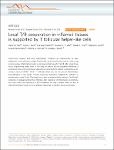Local T/B cooperation in inflamed tissues is supported by T follicular helper-like cells
Van, Dana Vu
Beier, Katja C.
Pietzke, Lea-Jean
Baz, Maysun S. Al
Feist, Randi K.
Gurka, Stephanie
Hamelmann, Eckard
Kroczek, Richard
Hutloff, Andreas
Autoimmune diseases and other inflammatory conditions are characterized by large lymphocytic tissue infiltrates in which T and B cells can be found in close contact. Here, using a murine airway inflammation model, we compare antigen-specific T and B cells in lung tissue versus lung-draining lymph node. In the lung we identify a B-cell population exhibiting a classical germinal centre phenotype without being organized into ectopic lymphoid tissue. By contrast, classical CXCR5+ Bcl-6+ T follicular helper cells are not present. Nevertheless, lung-infiltrating T cells exhibit follicular helper-like properties including the potential to provide help to naive B cells. The lung tissue is also a survival niche for memory T and B cells remaining in residual peribronchial infiltrates after resolution of inflammation. Collectively, this study shows the importance of T/B cooperation not only in lymph nodes but also in inflamed peripheral tissues for local antibody responses to infection and autoimmunity.
No license information
Related Items
Show related Items with similar Title, Author, Creator or Subject.
-
2010-05-24ZeitschriftenartikelInducible costimulator (ICOS) blockade inhibits accumulation of polyfunctional T helper 1/T helper 17 cells and mitigates autoimmune arthritis Frey, Oliver; Meisel, Juliane; Hutloff, Andreas; Bonhagen, Kerstin; Bruns, Lisa; Kroczek, Richard; Morawietz, Lars; Kamradt, ThomasObjectives: Inducible costimulator (ICOS) and its ligand (ICOSL) regulate T and B cell responses. Glucose-6-phosphate isomerase (G6PI)-induced arthritis requires T and B lymphocytes. It was hypothesised that blocking ...
-
2013-04-15ZeitschriftenartikelGiardia duodenalis arginine deiminase modulates the phenotype and cytokine secretion of human dendritic cells by depletion of arginine and formation of ammonia Banik, Stefanie; Viveros, Pablo Renner; Seeber, Frank; Klotz, Christian; Ignatius, Ralf; Aebischer, ToniDepletion of arginine is a recognized strategy that pathogens use to evade immune effector mechanisms. Depletion depends on microbial enzymes such as arginases, which are considered virulence factors. The effect is mostly ...
-
2015-07-06ZeitschriftenartikelOccult Hepatitis B Virus Infection in Nigerian Blood Donors and Hepatitis B Virus Transmission Risks Oluyinka, Opaleye O.; Tong, Hoang Van; Tien, Sy Bui; Fagbami, Ademola H.; Adekanle, Olusegun; Ojurongbe, Olusola; Bock, Thomas; Kremsner, Peter G.; Velavan, Thirumalaisamy P.Background: Occult hepatitis B virus infection (OBI) characterized by the absence of detectable HBsAg remains a potential threat in blood safety. We investigated the actual prevalence, viral factors and genotype of OBI ...

